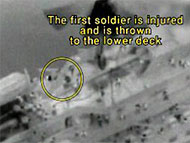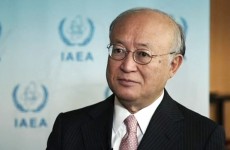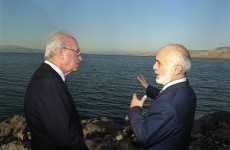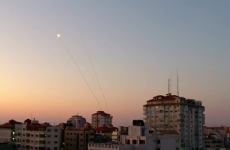 Are Israel and Turkey about to resolve their bitter feud?
Are Israel and Turkey about to resolve their bitter feud?
Jerusalem and Ankara are reportedly on their way to signing a ‘memorandum of understanding’ at secret talks held in Switzerland. If so, it could not have come at a better time. In the midst of the EU’s branding of Israeli products from West Bank settlements and the BDS campaign being mounted against the Jewish state, Israel will have scored a major strategic coup with Turkey. However, government sources in Jerusalem caution that ‘it’s not over until it’s over’ and Erdogan is known to be very unpredictable. Just ask Russia’s President Putin. But if two of the strongest states in the region are about to bury the hatchet, it is unlikely they will restore their former alliance that was the most powerful in the Middle East.
Ironically, Prime Minister Netanyahu can thank President Putin. It is not that Turkish President Erdogan has seen the light; after severing relations with Jerusalem in a bold but reckless bid to assume leadership of the Arab Sunni Middle East, Erdogan has run afoul, not only of the Arab states, but even of Russia. The deliberate Turkish shooting down of a Russian jet was a reckless error. As part of his punishment, Putin has threatened to cut off Russia’s critical gas supply to Turkey. Israel is about to start producing its own offshore gas deposits that can make up part of Turkey’s shortfall. Strategic energy is often the mother of international deals, and so Erdogan has had to re-evaluate his foreign policy in the wake of his clash with Russia. Lo and behold! Israel has popped up on his drawing board.
There is also talk of laying a pipeline from Israel’s offshore gas deposits directly to nearby Turkey, just up the Mediterranean coast. By the way, the Turkish coup will mean ‘game over’ for the internal debate in Israel over the terms of the gas deal. In the upcoming Supreme Court hearing, it will vindicate Netanyahu’s case that the proposed contract with the Tshuva concern and the American company, Noble Energy, is in Israel’s strategic interest.
Beware the blockade…

Israel is to pay 20 million dollars compensation to the families of the nine Turkish activists who were killed in the violent clash aboard the Turkish vessel, Mavi Marmara, when it led a convoy that tried to break the Israeli blockade of Gaza on May 31, 2010. A UN enquiry later ruled that Israel’s blockade was ‘legal under international law’ in order to prevent weapons and rockets from reaching Hamas in the Gaza Strip. It also found that Israeli commandos, who descended by ropes from helicopters, faced ‘significant, organized, and violent resistance’, and were required to use force for their own protection. Nonetheless, Erdogan used the incident to expel Israel’s ambassador and to punish Israel by slashing ties. Doesn’t it sound like Putin’s position toward Turkey today? In any case, Ankara and Jerusalem will reportedly send back their ambassadors. In the past, Netanyahu apologized for ‘any errors that could have led to the loss of life’. That was another Erdogan condition in addition to the compensation.
 But amid the new wave of optimism, there is one crucial question that is still unanswered. In the past, Erdogan has demanded that Israel lift the blockade of Gaza. This was a definite non-starter because the blockade bars the supply of rockets and weaponry to Hamas, which attacks Israel from time to time. So has Erdogan withdrawn this condition for the renewal of ties with Israel? If not, this could torpedo the deal. For his part, Erdogan is also said to have restricted activity by Hamas and Hamas operatives inside Turkey.
But amid the new wave of optimism, there is one crucial question that is still unanswered. In the past, Erdogan has demanded that Israel lift the blockade of Gaza. This was a definite non-starter because the blockade bars the supply of rockets and weaponry to Hamas, which attacks Israel from time to time. So has Erdogan withdrawn this condition for the renewal of ties with Israel? If not, this could torpedo the deal. For his part, Erdogan is also said to have restricted activity by Hamas and Hamas operatives inside Turkey.
Regional implications…
Erdogan demands that Assad must go, whereas Netanyahu has steered clear of any role in the current civil war in Syria. If Assad goes, who will replace him? Daesh? Iran, like Russia, is 100% behind Assad and has even sent its forces to fight on his behalf against Daesh and the other rebels. But there is no question that if the Israeli-Turkish reconciliation comes off it will send a strong message to the entire Middle East. It will also weaken the Palestinian claim that Israel is not interested in making peace with the Muslim world. It will serve to strengthen Israel’s current peace accords with Egypt and Jordan. (An Egyptian jet inadvertently violated Israel’s air space while attacking Daesh forces in Sinai – Israel did not shoot it down).
However, Israel’s former Foreign Minister, Avigdor Lieberman, opposes an accord with Turkey, contending it will harm Jerusalem’s relationship with Greece and Cyprus, as well as Egypt. Why Lieberman includes Egypt is beyond me. Lieberman, formerly from Russia, has good ties with Putin, and maybe that explains his position. As for Russia, if Israel does sell gas to Turkey this would not be a big deal for Putin who has much bigger fish to fry.
Moreover, Putin is about to deliver his advanced S-300 anti-aircraft missiles to Iran, Israel’s archenemy. As for the U.S., it has been urging its two closest allies in the Middle East, Israel and Turkey, to resolve their differences. In addition, Israel has also been conducting back-door diplomacy to promote its ties with Saudi Arabia and the Gulf States in light of the Daesh threat.
Israel’s top secret agent…
It appears that Yossi Cohen, the newly appointed Mossad chief, is not only considered to be an Israeli James Bond, but also a master diplomat. Serving in his current role as head of the National Security Council, Cohen is credited with engineering the diplomatic breakthrough with Erdogan, who is no easy client.
Amano lucky hara-kiri has gone out of practice…

The IAEA has just issued its long awaited report required for the nuclear deal to go into effect. Under great pressure from the U.S. and its partners, the IAEA caved in. Director Yukiya Amano of Japan read out the findings – a whitewash of Iran’s nuclear weapons project:
‘The agency has no credible indications of activities in Iran relevant to the development of a nuclear explosive device after 2009’.
In other words, the IAEA does have ‘credible indications’ the Iranians were, as Israel has insisted, been working on their nuclear weapons project at least until 2009! Amano actually agreed that the Iranians take their own soil samples from the military base of Parchin, where Israel has said it has ‘reliable information’ the Iranians have been working on nuclear detonators. Yet, Amano had the chutzpah to declare:
‘As is the case with all my reports, this assessment is factual, technically sound, and balanced’.
Really?! Indeed, Mr. Amano did have a record of keeping the Iranians’ feet to the fire in his previous reports. But how can he truthfully make such a statement after he permitted the Iranians to send in their own soil samples from the military base of Parchin? He is fortunate that in his own country the practice of hara-kiri for the loss of personal honor has gone out of practice. David Albright, the respected American nuclear expert, has criticized the IAEA’s approach to Parchin:
‘The Parchin issue has become one of the main key outstanding issues to the IAEA in resolving its concerns about Iran’s past on possibly ongoing nuclear weapons work and military fuel cycle activities. Despite repeated requests (from early 2012) by the IAEA and its Board of Governors to allow IAEA inspectors access to this specific site, Iran denied access, and instead undertook substantial reconstruction and site modifications… the IAEA was able to makevery limited additional progress on resolving this issue‘.
However, U.S. Secretary of State John Kerry says not to worry. In the view of him and his boss, Obama, the main thing is not what Iran has done in the past, but what it will do now. But if the IAEA failure at Parchin is an omen of things to come this is a grave cause of concern.
Moreover, Iran recently launched another ballistic missile with the capability of delivering a nuclear warhead. This is in violation of a UN resolution and the UN Security Council. U.S. representative, Samantha Power, actually chastised her colleagues for not taking a more critical approach to the missile launch! As if America were taking a tough stand against Iran’s violations in the field of nuclear weapons. But again, Mr. Kerry is not unduly worried. Maybe that’s because Iran’s ballistic missiles cannot reach the shores of the Atlantic seaboard yet.




